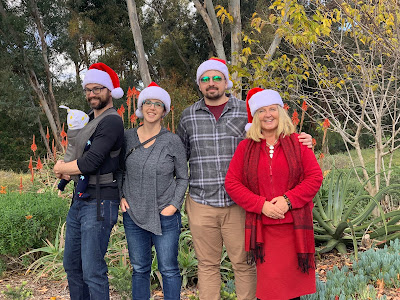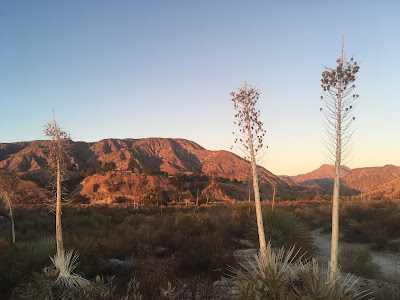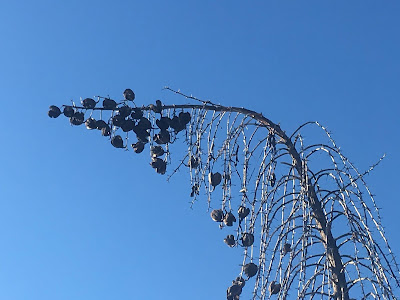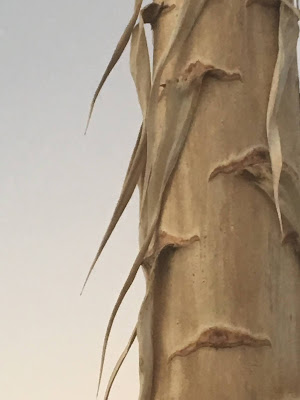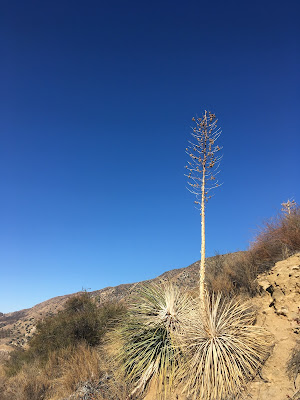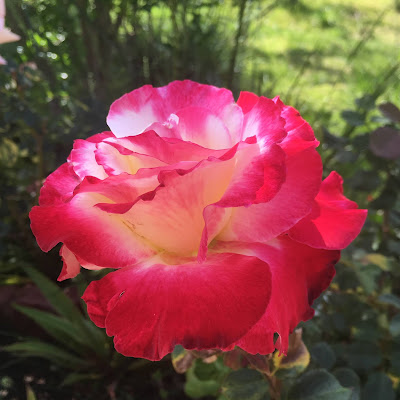It is so good to be sixty-four. My daughter sang me the Beatles' song on the beach, with ukulele, delightful belated birthday gifts during all too rare family encounter. We live too far apart, I do not like calling, the phone traumatized me when I was just four year old - that black box on the wall is my aunt? And the fear persisted, reducing my conversations to 20 seconds - what do you need? Which street corner should I drive up to pick you up? Do I need to stop to buy bread and milk? This sort of thing, not thoughtful, insightful conversations... These are best done in person, in a dialog of souls, during random meetings at poetry readings, champagne lunches, on the beach...
We had a lovely event in our community, Passing of the Laurels to the next Poet Laureate of Sunland Tujunga. My term as PL no. 6 was in 2010-2012; this time Pamela Shea passed the laurels to Alice Pero, both accomplished, graceful, insightful poets.
I brought real laurel leaves in bouquets for poets, and huge artichoke leaves in bouquet of silk flowers, to decorate the stage. Looked pretty enough, they danced in the breeze, making silk blossom seem alive and real. I picked all these leaves and branches from a friend's garden, where I was amazed at the sight of the artichoke plant which made me think of poetry. I told a friend, poet about this experience, and a poem came about. Here it is.
An Artichoke of a Poem
Writing poetry is like growing
artichokes, from a seed of invention,
the code for the unknown, sprouts
an immense plant, with spreading
silvery-green fronds of tender beauty –
poem after poem you spin out and admire,
so proud of your way with words,
constructing verbal edifices
with arduous labor.
The heart comes at the end –
a flower bud no larger than your palm
that does not even open before you pick it
to steam and taste bits of elegance
and sophistication.
Hight above your silver tower of gigantic
soft and spiky leaves – a paradox of a plant,
really, its purpose beyond comprehension –
grows just one artichoke, a golden bud
of a poem where each word is in its place,
each insight so accurate and keen,
it pierces the reader’s mind
with knowing.
You discard abundant, decorative
leaves for compost, to nourish next year’s crop –
just one gourmet treat, an artichoke of a poem,
blooming from so many ornamental words
you string together day after day, until
the mystery
reveals itself
to surprise you
with its inevitable
simple grace –
Well, that was insightful enough for the Poet Laureate of Artichokes and Bay Leaves (another name for Laurels).. . Celebration took a lot longer to organize than to experience. Then it was time to continue the internal dialogue on paper, in a dialog with old, discarded selves. Spring cleaning is good for that.
Spring Cleaning
This morning
I declawed the cactus, cut the spikes
from the tips of agave leaves
so they do not scratch children looking for
chocolate eggs on Easter.
I cleaned out the pantry, sorted out
one bookshelf and my past
carefully discarding useless fears
and fading disappointments.
I filled the crystal bird dish
with water for finches, filled my heart
with affection and delight
I arranged lilacs, and daffodils
into fragrant bouquets, green with
camellia leaves and palm fronds left over
from singing Hosanna in the church.
I arranged mt thoughts
Into a singular clarity of purpose
Tranquil lie the pacific at sunset
With tenderness of immense strength.
Now, I only have to breathe in
noon light, to set old pain,
anger and resentment on fire
expel the ashes in a shower of sparks
with diamond rays so brilliant
they make me into a supernova
a revelation, cosmic, bright –
Cleaning is necessary and healing. The "cleaning" of past emotions and traumas is done once they do no longer hurt, are not painful, just there, fondly remembered, examined and set aside on a shelf of favorite things - ornamental crystal spheres, a mosaic flower vase from Ravenna, a wooden angel from Krakow, a gold and cobalt teacup and saucer of my Mom, children's photos and music boxes. So, after a long, long, long love story, I could finally write its coda.
The Year of Crystal Fire
Soft patter of pink rose petals
falling onto the floor. The scent of French Perfume
in the air. The heartbeat stops. The world ceases its rotations.
I see the light in your eyes shining
through the slit in your motorcycle helmet,
as you pass me on the street. In a millisecond
of recognition you take me in – whole,
serene in turquoise and aqua – then, you look away
far into the past we shared so shamelessly,
beyond measure –
the year of passion
the year of dogs that brought us together
the year of longing
the year of dolphins dancing on salty waves
the year of absence
the year of waiting in darkness –
30-second phone calls answered by a machine
the year of tiger lilies
the year of nine-tailed foxes –
smooth with seduction and delight
Yes, I liked that year the most –
as we grew into our demonic, daimonic selves,
created new galaxies, parallel universes
out of our other-worldly love.
Timelines shift.
The cosmic windows
keep opening and closing.
Soft patter of pink rose petals
on the flying carpet
takes me into
the year of passion
the year of tiger lilies
the year of diamond kites soaring above hilltops
the year of stardust
the year of crystal fire



























